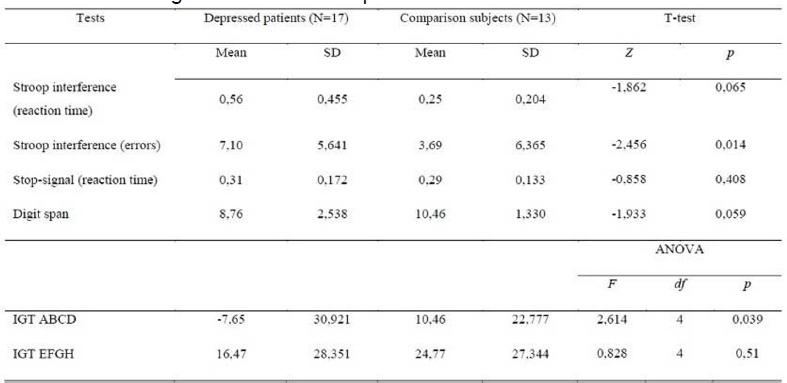Article contents
Cognitive Functioning of Depressed Patients with History of Suicidal Attempt
Published online by Cambridge University Press: 15 April 2020
Abstract
Major Depressive Disorder (MDD) is a complex disease characterized by cognitive dysfunctions. The subgroups of MDD show different cognitive profile.
The aim of this study to examine whether depressed suicide attempters show impaired executive functions.
We hypothesised that patients from this subgroup have decision making, cognitive inhibition and verbal working memory deficits.
17 depressed patients with history of suicide attempt and 13 healthy subjects completed the reward and punishment-related versions of a decision making task (Iowa Gambling Task, IGT), an irrelevant-respond inhibition task (Stroop Task), a respond inhibition task (Stop Task) and a measure of verbal working memory (Digit Span).
Depressed patients showed impairment in the reward-related version of IGT (ABCD) and higher error-interference effect in the Stroop Task. There was a tendency toward higher reaction time-interference in Stroop Task and worse performance in Digit Span. Their performance did not differ from healthy controls in the punishment-related version of IGT (EFGH) and in the Stop Task.
Reward-related decision making, irrelevant-respond inhibition and verbal working memory dysfunctions were more frequently found among the patient group. They perform normally in the punishment-related version of IGT, while preliminary studies show that patients who attempt suicide within 72 hours perform poorly in this task. Further studies should examine whether punishment-related version can differentiate high-risk suicide attempters.

- Type
- Article: 0642
- Information
- European Psychiatry , Volume 30 , Issue S1: Abstracts of the 23rd European Congress of Psychiatry , March 2015 , pp. 1
- Copyright
- Copyright © European Psychiatric Association 2015
- 2
- Cited by



Comments
No Comments have been published for this article.